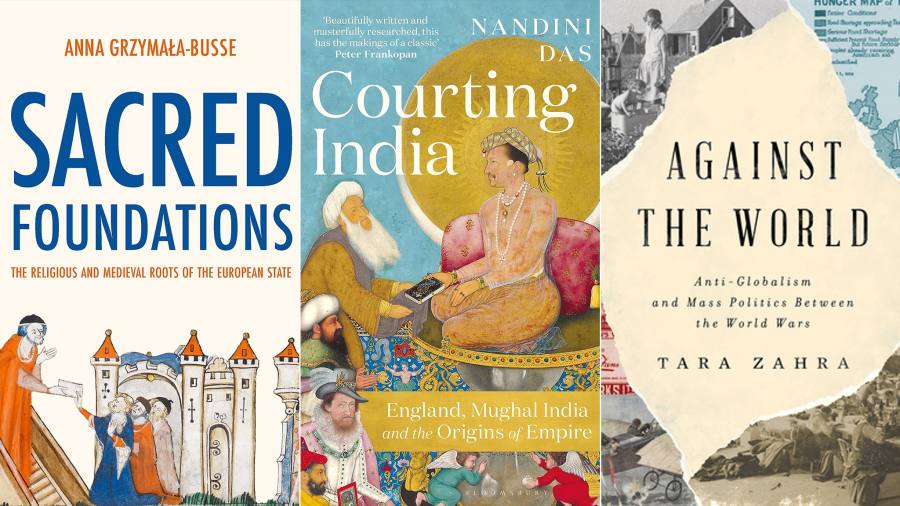Receive free History books updates
We’ll send you a myFT Daily Digest email rounding up the latest History books news every morning.
Revolutionary Spring: Fighting for a New World 1848-1849 by Christopher Clark (Allen Lane/Crown)
Author of Iron Kingdom and The Sleepwalkers, two acclaimed books on Prussian history and the causes of the first world war, Christopher Clark has delivered another masterpiece in Revolutionary Spring. The European revolutions of 1848 were complex in their origins, course and long-term impact, and Clark tells the story as well as anyone ever has.

Courting India: England, Mughal India and the Origins of Empire by Nandini Das (Bloomsbury/Pegasus Books)
The earliest official encounters between England and India at the opening of the 17th century are the subject of this impressive book. Nandini Das, professor of early modern English literature at Oxford university, draws on a rich range of sources in many languages to paint a fascinating picture of contrasting courts and cultures.

Birchers: How the John Birch Society Radicalized the American Right by Matthew Dallek (Basic Books)
Founded in 1958 by businessman Robert Welch, the John Birch Society was so fiercely anticommunist and obsessed with conspiracies that it was often dismissed as a cold war fringe movement. As Matthew Dallek’s lively history demonstrates, the movement helped to reshape American conservatism in ways that resonate to this day.

Sacred Foundations: The Religious and Medieval Roots of the European State by Anna Grzymała-Busse (Princeton)
The origins of the modern European state are conventionally traced to the era between 1500 and 1800. Anna Grzymała-Busse makes a convincing case that we should go several centuries back and look at the way that rivalries between the papacy and the Holy Roman Empire and other trends framed the emergence of European states.

The Blazing World: A New History of Revolutionary England 1603-1689 by Jonathan Healey (Bloomsbury/Knopf)
The political, social and intellectual turbulence of 17th-century England is narrated in masterly style by Jonathan Healey, an Oxford university historian. Rich in unusual details and penetrating in analysis, his book illuminates the lives of ordinary people as well as the fiercely contested battles of high politics.

Elixir: A Parisian Perfume House and the Quest for the Secret of Life by Theresa Levitt (Harvard)
The popularity of Eau de Cologne peaked in early 19th-century France, when Napoleon Bonaparte was said to get through 60 bottles a month. Theresa Levitt, a University of Mississippi professor, has produced a delightful history of science and scent at the dawn of the modern age.

The Angel Makers: The True Story of the Most Astonishing Murder Ring in History by Patti McCracken (Mudlark/William Morrow)
In 1929 a small Hungarian village was revealed to have been at the heart of a mass murder spree in which local women got rid of unwanted relatives by poisoning them with arsenic. Patti McCracken brings to life this long-forgotten tale in a grimly gripping narrative.

The Soviet Century: Archaeology of a Lost World by Karl Schlögel (Princeton)
In a work of remarkable range and quality, Karl Schlögel explores the everyday life and material culture of the Soviet Union in ways that show the communist experiment in a compellingly fresh light. One of the most innovative books on Soviet history to appear since the state’s collapse in 1991.

The Penguin History of Modern Spain: 1898 to the Present by Nigel Townson (Allen Lane/Penguin)
In the late Franco era, the government promoted its burgeoning tourism industry with the slogan “Spain is different”. In what now ranks as the most reliable, up-to-date general history of modern Spain in the English language, Nigel Townson shows that the country was less of an outlier in comparison with its western European neighbours than often supposed.

Against the World: Anti-Globalism and Mass Politics Between the World Wars by Tara Zahra (WW Norton)
Discontent with globalisation has a history stretching back to the first half of the 20th century. Tara Zahra, a University of Chicago scholar, has written a panoramic work illustrating how societies across the world reacted in the interwar era against the perceived threats of a globalised economy.
Join our online book group on Facebook at FT Books Café
Read the full article here




